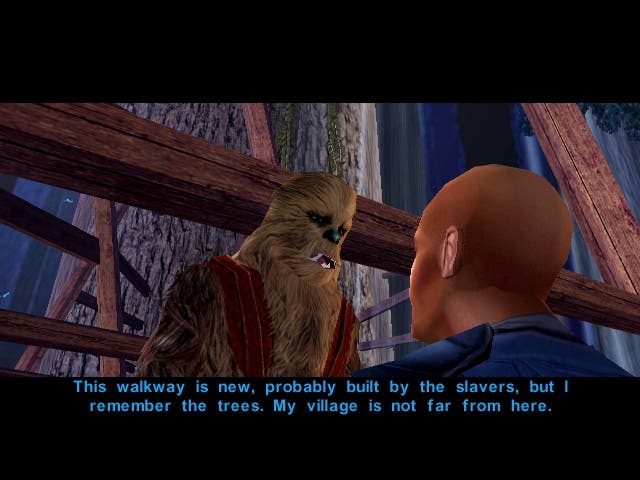Reader Reviews
Deus Ex 2, Final Fantasy X, Star Wars KOTOR, Flipnic, Guilty Gear X2, BF Vietnam, Zelda: Majora's Mask, Tomb Raider - your views on all of them.
Star Wars: Knights of the Old Republic (Xbox)
by Richard Taylor

With the recent news that Obsidian Entertainment are penning a sequel to Star Wars KOTOR (I nominate the title Knights of the Old Republic Strike Back), now seems a good time to reminisce about the original, released a long time ago when our solar system had only nine planets. In KOTOR, BioWare managed to pull off a rare trick - an eminently playable 'western-style' RPG with almost endless storyline options and genuinely interesting customisable characters.
You begin the game having been rudely awakened by a colossal space battle, and the first task after finding some clothes is to escape your stricken spacecraft. Taking the classic Star Wars method of leaping into a handy escape pod you eventually crash-land on the nearest planet, a Coruscant-style cityscape called Taris.
From here the choices really are up to you. There are a number of planets to explore - from the arid deserts of Tatooine to the dank forests of wookie-tastic Kashyyyk - but the order in which you visit them is up to you. Each progresses the strong story and the main quest to follow two sinister dark Jedi lords and discover why they have been roaming around the galaxy indulging in a spot of intergalactic pilfering. But each planet also has a series of side-quests, which are not forced upon you, but are recommended because of the experience and items that can be gained - and because they are... well, fun.
Yes, fun. Advancing your character through general combat is all well and good, but in KOTOR you can also develop by participating in numerous Jedi-type tasks. Want to solve murders? Arbitrate in family disputes? Reunite lost children with their parents? Well, sign up here - the force needs you. Oh, and of course it has L1ght5ab3r5 in it.
Graphically, the game can be stunning. Combat graphics are sharp, explosions are bright. Large battles can be spectacular - a half-dozen Jedi fighting it out with force powers looks striking, although later levels are hindered by a touch of slowdown. The backgrounds are also eye-catching - check out the views on the otherwise dull volcanic planet of Korriban. Running animations are a little off however - characters run like Mark Hamill running from a Rancor, and there are only a limited choice of faces for the many NPC's you encounter (I counted about three), but the fluidity of the graphics elsewhere make up for this.
KOTOR takes the RPG-standard three-to-a-party system, but there are up to nine other characters that can accompany you on your quest. Some of them will join to help you, others you have to help in order for them to join. Each one has a story to tell, which they frequently do. All the characters succeed in being interesting, useful (they all have different skills), and even funny - you've gotta love those droids...
Combat is handled by an in-battle menu system. When an opponent is first spotted, the action pauses allowing you the first move, whether it be a crafty first shot or the chance to quickly equip a shield or one of the many stat-boosting stimpacks. Or lob a thermal detonator and run. When fighting you need to watch health and force levels for each character, but cycling through your three party members or selecting a new tactic/power is always easy, even in the more frantic of battles.
So far, so standard-RPG. Allowing for the undeniable excitement of interacting with the Star Wars universe, what is there to separate KOTOR from the multitude of other plot-driven RPG's available? Two words... the force.
Hokey religions may not be a match for a good blaster, but you'll soon learn that the all-pervading force controls you and everything around you. Every choice you make has an impact on the outcome of the game, every conversation with your companions or an inhabitant of a planet has a number of differing options. For example, Taris has a problem with rampaging mutants in the undercity (and you thought traffic congestion was a pain). Early on you find a doctor working on an antidote, but he can't get hold of any serum to synthesise as the planet is under curfew. When you obtain a sample of the serum you are faced with a number of choices. Do you give it to the doctor to aid his research? Or do you give it to the shunned undercity dwellers so they can directly cure their comrades? You could give it to a patrol of soldiers about to enter the undercity to wipe out the mutants - or you could be darker still and sell the serum to a cruel overlord for a pile of credits.
Dark. That's a word you'll hear a lot of during KOTOR. Light too, as opting for one of the above choices propels you inexorably towards either end of the force and your ultimate destiny as either a noble Jedi lord or a twisted Jedi master. It's this differentiation that is KOTOR's strongest point - and its unique advantage over other epic RPG's. Longevity simply isn't a problem as the games diverge so much that after completing this excellent game once you'll want to play through again as the other 'side' just to see how it affects the outcome. The temptation to play KOTOR is almost powerless to resist...








